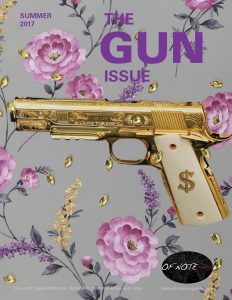Caridad Svich: Gun Violence Takes Center Stage
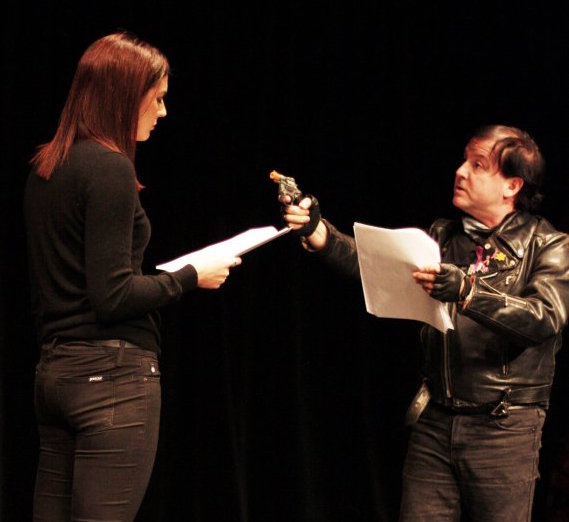
“Irony of the Second Degree” by Kyle Bostian. Read by Alison Meredith and Craig Walker at Darlinghurst Theatre in Sydney, Australia. © Stephen Carnell, 2013.
[The idea that a woman with a gun is a woman with power]. . . is a trope which privileges a masculine ideal. — Caridad Svich
BY BUREEN RUFFIN| THE GUN ISSUE | SUMMER 2017
“I’m gonna go knock on her door – knock-knock-knock—and when she opens it … I am gonna walk up to her and I’m gonna put the barrel of this revolver right up against her skull… I am. I am gonna do that and then I’m gonna smile at her, smile and lean in real close, all up in her face and I’ll whisper, ‘Was it worth it, CeeCee …’ right before I blow her fucking head off.” —excerpt from “Cecelia,” a play by Neil LaBute, featured in 24 Gun Control Plays.
Guns are a cultural artifact, writ large. They have become a part of our collective American consciousness almost without notice, a fact that makes the debates over the role of guns in our society difficult to navigate and the issue of gun violence particularly murky. Even so, the troubling normalcy of mass shootings at schools and on college campuses, shootings involving the police, and the polarizing debates over gun control simply underscore our collective responsibility to deal with America’s gun problem.
In 2013, Caridad Svich, the 2012 Obie Award winning playwright, and fellow dramaturg Zac Kline, launched the Gun Control Theatre Action (GCTA) through their NoPassport Alliance. GCTA was set to coincide with the March On Washington for Gun Control, which came on the heels of the December 2012 Sandy Hook Elementary School shooting in Newtown Connecticut, the deadliest school shooting in U.S. history. The incident, which left 20 children between the ages of six and seven dead, reignited the gun control debate in the United States.
The goal of the GCTA was to create a space for dialogue and healing through art. Dramatists and poets were asked to submit short plays that would be presented at Georgetown University’s Gonda Theatre in Washington D.C. Shortly after the Newtown shooting, a friend and fellow playwright asked Svich if she was planning to write a play addressing gun control. Svich admits to initially feeling a sense of distress and despondency about how theatre might address the issue, but felt it was urgent to speak out, especially since calls for gun control seemed to have fallen on deaf ears. “The GCTA was a kind of turning point,” says Svich, when I met with her to talk about her work relating to gun violence and social activism, “because the laws didn’t change [after the Sandy Hook shooting].”
The new plays took on the issue of gun control and gun violence fearlessly and unflinchingly, asking audiences to witness, reflect, and think critically about their own feelings and beliefs on the culture of guns in the United States. The short works from the GCTA were later collected in the book 24 Gun Control Plays, edited by Kline and Svich and published in 2013 by NoPassport Press, offering readers the opportunity to thoughtfully consider multiple viewpoints on the gun control debate.
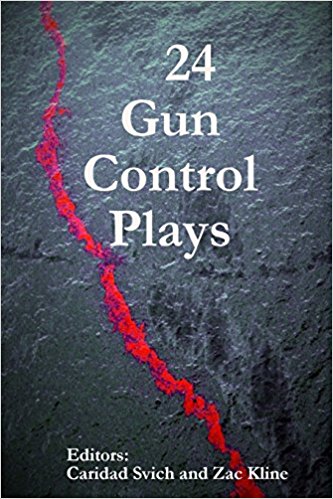
Svich, a self-proclaimed “hybrid Latina” who is bilingual, was born in the United States to Cuban-Argentine-Spanish-Croatian parents. The intersection of her American birth and cross-cultural heritage coupled with her nomadic childhood informs her work. She has a built-in outsider lens of sorts that allows her to see things from different perspectives and naturally engage with diverse voices and experiences. It also seems to have fostered a deep connection with voices and experiences that have been othered. Even as a high school student, writing her first plays, her artistic eye sought to illuminate themes of marginalization, human relationships, and reflections of what was going on at the street-level, so to speak, of society.
Her approach, which is inherently collaborative, has been refined over time to one that is “more challenged [by]” and “more awake” to its environment, she says. This malleability underscores Svich’s concern with challenging form. Art that reacts quickly and molds itself with or against whatever it is that is within its view must necessarily be willing to take on different forms and aesthetics. “Art should be nimble,” says Svich.
In the last 15 years, Svich’s work has come to embody this idea of what she calls “hyperlinked dramaturgy”—a kind of “rapid response” art that is witnessing and dialoguing with an urgency that parallels the immediacy of day-to-day life. That creative work, she says, seeks to answer questions such as, “Who is hurting and why?” “How do we connect [as people] and why?” ”How do we alienate each other and why?” The plays that emerged from the GCTA sought to engage with gun tragedy by considering these questions so important to Svich’s work.
The complexity of the gun debate makes it challenging to discuss, especially as it relates to women and gun violence. Svich, who was also a contributor to the GCTA, found several pieces particularly resonant. Playwright Neil Blackadder’s piece, “Dad’s Guns,” investigates how guns became a cultural phenomenon, notably through music and film. Similarly, Ian Rowland’s piece, “Troy Story,” explores how the idea of freedom came to be associated with guns.
In the late 19th century the Wild West imagery made its way into stories, novels, and eventually films. Ironically one of the first superstars of the Wild West was Annie Oakley—a fixture of Buffalo Bill’s Wild West Show, known for her sharpshooting skills. Svich and I discussed this persistent trope: the idea that a woman with a gun is a woman with power. “It’s a trope which privileges a masculine ideal,” she says. In truth, that idea has no basis in reality. A study cited in a recent article in The Atlantic, “Having a Gun in the House Doesn’t Make a Woman Safer,” found that “females are uniquely impacted by the availability of a firearm.” The study also found that “women with access to firearms become homicide victims at significantly higher rates than men.”
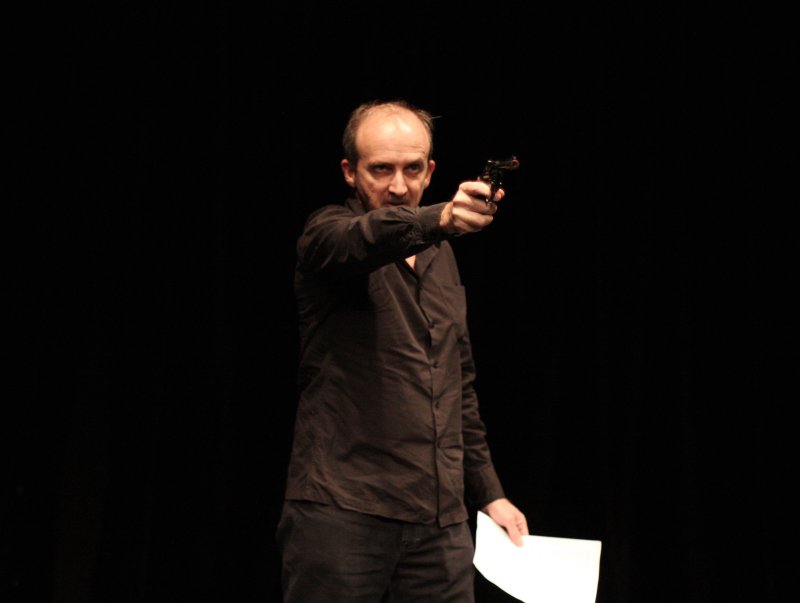
“Gun Play” by Oliver Mayer. Read by Tula Tzoras and Steven McGrath at Darlinghurst Theatre in Sydney, Australia. © Stephen Carnell, 2013.
Playwrights Gab Cody and Neil LaBute’s contributions to 24 Gun Control Plays both tackle the role gender plays in gun violence and the gun control debates. In “Cecelia,” Neil LaBute, the well-known writer and director, wrote a play that follows a man, angry and raging about his wife who had recently left their marriage. In a single ranty monologue, the main character at once bemoans and degrades his ex-wife, and at the end, tells the audience exactly how he plans to avenge her leaving him: with a shot to the head. In Cody’s “Everyday Villainy,” the source material is autobiographical. In one scene, the three-year-old narrator, her mother, and siblings witness the father character, in a rage, kill the family dog with a shotgun. Later, when the narrator is 21 years old, she learns that her grandmother had been murdered, shot and killed in a domestic dispute, rather than in a car accident as she had always believed.
For Svich, the fact that conversations about gun control and gun violence on both sides of the debate don’t include the experience of women speaks to a kind of “unspoken disregard for the female body” and its “dispensability.” Women are being killed at higher rates by guns and those facts are not reported. This disregard is reflected culturally as well. Crime, drama, and thriller films and television shows are often centered on a body—a woman’s body—one without agency and one whose death is, for purposes of dramatic television, thrilling.
Svich’s own contribution to the GCTA is a piece called “The Wake.” It is a prayer of sorts for those who have been lost to gun violence. An early stanza reads, “Today, we say/things will be better/We will learn/All hail a better society.” And at the end, “Shout: My sister in Kandahar/Is my nephew in Aurora/Whisper: My future husband in Columbine/ Will be my lover one day in Gaza/ The gun killed them/The same gun.”
The plays resonated deeply with audiences. When I asked Svich about the reactions of audience members to the plays, she said the responses were quite varied, revealing the anger, sadness, and despair that accurately reflects the complicated feelings around this issue. Following the initial action in Washington, D.C., NoPassport staged actions in New York City, Los Angeles, Seattle, Chicago, Sydney, and more.
Most recently, she and Kline launched AFTER ORLANDO: An International Theatre Action in response to the June 2016 mass shooting at Pulse nightclub in Orlando, Florida. Both the After Orlando Theatre Action and the Gun Control Theatre Action continue to bring the work of the artists and these important conversations to audiences all over the world.
And perhaps, too, this is a welcomed consequence to the art. To remember.
For Svich the end game is not necessarily about changing laws—she knows how hard it is to do that. For her, the theatre community is a generous space where artists can come together and create art that responds to the issues that are most important to human beings. “Art is empathy,” she tells me. “But it’s also important that it provokes, too. The theatre lives somewhere between the church and the brothel.”
Svich believes the theatre is able to uniquely reflect the fragility of human life and allow us to “tend and attend” to one another in all of our vulnerability and frailty. She hopes her work will provide an alternative narrative to the debate—using stories to provide understanding and ultimately, change.
♦
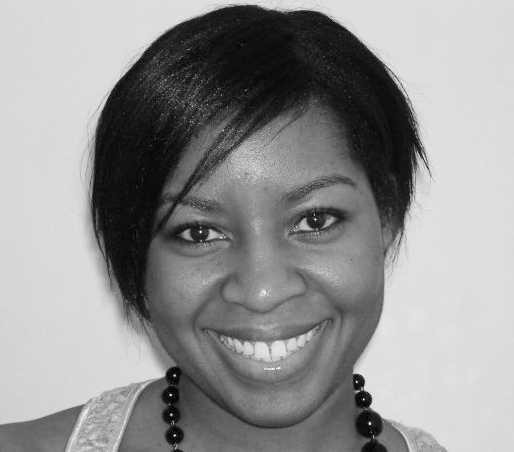
BUREEN RUFFIN
Bureen Ruffin is a writer and adjunct assistant professor in the Department of English at Pace University. She holds a Master of Fine Arts in Creative Writing and a Master of Arts in Liberal Studies from the New School. She was born in New York City to Haitian parents. She is currently working on a memoir.

